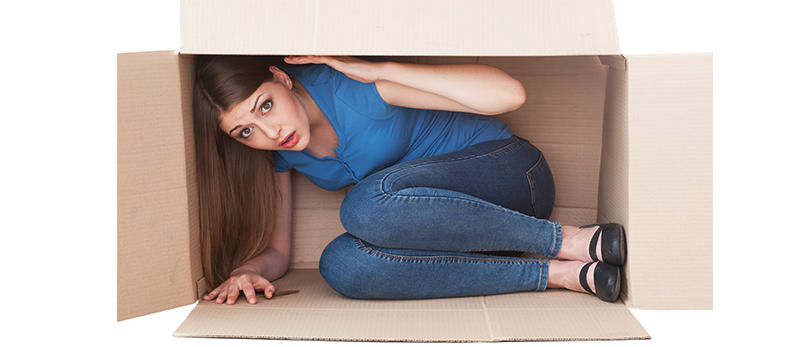Why do people become claustrophobic?
The causes of claustrophobia are not easily detectable but there are several theories. The origin and persistence of claustrophobic anxiety reactions can be explained by a conditioning model. This means that a neutral situation or object will gradually become associated with an anxiety reaction. This association, which persists over time, generates avoidance behaviours.

The more you try to avoid situations that cause you anxiety, the more you reinforce your fear of enclosed spaces
Whenever you try to develop strategies to avoid facing situations that are difficult for you, you maintain the fear of the feared object. In this way, it will always be impossible for you to know that the anxiety generated during the event is much less than when you anticipated it. This model alone does not provide a sufficient explanation for the development of claustrophobia, and needs to be supplemented by further research.
Fear of confined spaces can be hereditary but most of the time it develops on its own
Phobias often arise from a situation where you were put in danger as a child
The origins of fear are diverse and can be explained in different ways. It may originate in childhood or during adult development. The fear that has been provoked can gradually lead to avoidance behaviours and the fear of losing control when confronted with the phobogenic object. This creates a vicious circle: the more frequent these avoidances are, the more they maintain your phobia, or even increase it.
According to health professionals, the onset of symptoms may be the result of the development of a neurosis associated with other anxieties or may be the consequence of a trauma. If you have been repressing an anxiety for a long time (a place where it was difficult for you to get out: a car accident for example) or if you have lived during your childhood an experience of confinement that you interpreted as a punishment (isolation in the dark at bedtime), then all the negative stimuli linked to closed rooms are assimilated to a feeling of fear.
Generally speaking, it is when you are going through a difficult time in your life, when you feel physically and psychologically weak (slight depression, low mood, fatigue, lack of self-confidence, etc.) that the first crises occur. This fear may appear gradually, but it can also be triggered overnight.
Psychological trauma can lead to fear of enclosed spaces
Claustrophobia can occur at any time in life as a result of a trauma, whether or not it had a direct impact. If the trauma has not had a direct impact, it can reappear at another time in life, without the person even expecting it. The phobia can also appear suddenly, following a psychological trauma. Being locked in a room because of a fire is not the same as being momentarily locked out of your flat until you find your lost keys. The dimension and psychological representations of the event are very different. The first situation may be sufficient to explain the origin of the phobia, whereas in the second, this moment of anxiety could be an expression of an already existing but unrevealed phobia.
Vicarious trauma can also occur. If you have witnessed an incident or someone close to you having a particular problem with confined spaces (e.g. a person stuck in a lift who becomes unwell), this may cause high anxiety in you too.
The impact of our family or loved ones
Education can also play a more or less important role in the development of claustrophobia. Family overprotection, with parents or relatives regularly reminding us to be careful in this or that situation or forbidding us to do activities in certain enclosed places, can also create anxiety that turns into a phobia.
Apart from the educational component, there is also a hereditary origin in the development of claustrophobia. Indeed, if one or both of your parents suffer from claustrophobia, you are more likely to develop the same type of phobia.
Be careful, however, these different possibilities of origin of claustrophobia will create predispositions to develop this type of phobia. But it is not because you have overprotective relatives or relatives who suffer from claustrophobia that you will necessarily suffer from it too.
Link between claustrophobia and the perception of space :
We all have a perception of the space close to us, which is more colloquially called “our personal bubble”. The width of this space varies from person to person. Some studies tend to show that people who have a larger “personal bubble” will tend to suffer more from claustrophobia.


